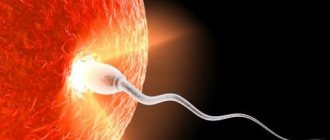Conditions necessary for conception
Every month, a woman’s body prepares for the fertilization of an egg and the further bearing of a child. Let's consider what changes occur in the reproductive organs during the menstrual cycle of standard duration (28 days).
| Period | Cycle days | Changes taking place |
| I (follicular) phase | 1-14 | The phase begins with menstruation, during which the egg, unfertilized in the previous cycle, is released along with the exfoliated endometrium. Under the influence of estrogen, a new egg matures in the ovaries, and the endometrium thickens. |
| Ovulation | 14-16 | Estrogen levels peak, which promotes the production of luteinizing hormone (LH). The mature follicle ruptures and the egg leaves the ovary. The corpus luteum (ruptured follicle) actively synthesizes progesterone. Only during this period is fertilization possible. |
| II (luteal) phase | 14-28 | The production of LH in large quantities promotes the synthesis of progesterone, under the influence of which the endometrium becomes loose, which is necessary for the successful implantation of a fertilized egg. If fertilization does not occur, then the level of progesterone drops, as a result of which the blood vessels in the endometrium narrow, and it is rejected, and menstruation begins. The cycle repeats again. |
If the menstrual cycle is regular and ovulation occurs in the middle, which is confirmed by data from special tests and basal temperature, then unwanted pregnancy should be protected on days when the probability of conception is high (8-16 days). It is also worth considering the fact that sperm live in a woman’s genital tract for up to 7 days. A possible disruption of the monthly cycle can lead to a delay in the ovulation date.
Many people mistakenly believe that the fact of the onset of menstruation is the main sign of the normal functioning of a woman’s reproductive system. However, ovulation plays a key role in conception. Therefore, in some cases, pregnancy occurs without previous menstruation.
I haven’t had my period for a year now – is there a chance of getting pregnant?
If you ask an experienced doctor whether it is possible to get pregnant during menopause if there are no periods, he will not be able to answer accurately, because the female body has always been famous for its surprises. Unexpected conception, and a long time after the last menstruation, is also far from an exception to the rule, but a common event that can be prepared by an unpredictable egg.
Is it possible to conceive if you haven’t had your period for a year? We should not forget that in a woman’s body, the genital organs take a long time to adjust to changing the functions of the processes inherent in nature, so there is no need to hope that pregnancy is completely excluded. Moreover, it is still too early to relax - you need to protect yourself for a long time, especially if adding to your family is no longer desirable.
Even a year after your last menstruation, you need to carefully monitor your health and well-being. Often, women mistake the first signs of pregnancy for symptoms of menopause, which they will later have to repent of - conception has already occurred, and all that remains is to decide what to do next, give birth or go for an abortion, which may be too late.
https://youtu.be/rrKSFY5Bxag
Pregnancy with amenorrhea
The regularity of the menstrual cycle and the presence of the ovulatory phase depend on many factors: the functioning of the endocrine system, exposure to stress, illness, nutrition, etc.
If there is no menstruation for 6 months, then intensive therapy is rarely performed. Otherwise, when the delay exceeds six months, the woman is diagnosed with amenorrhea.
Classification of amenorrhea:
| Type of amenorrhea | Subspecies | Characteristic |
| Natural | — | Appears before puberty, during pregnancy and lactation, and menopause. |
| Pathological | Primary | There are no signs of puberty or menstruation in girls over 16 years of age. |
| Secondary | Long delay with a previously established cycle. It can occur with diseases of the genital organs and complications after surgical procedures (abortion, removal of ovaries, etc.). | |
| True | Physiological | There is no menstruation or ovulation, so pregnancy is impossible. The natural absence of menstruation is a manifestation of true physiological amenorrhea. |
| Pathological | Appears when the endocrine system, pituitary gland, hypothalamus, gynecological diseases, overweight or underweight are disrupted. | |
| False | — | Occurs with congenital anomalies or absence of reproductive organs. |
Medicine knows cases of unexpected pregnancy in women with natural amenorrhea. With this form of pathology, fertilization of the egg occurs before the onset of menstruation. Let's consider such situations in detail.
What is amenorrhea and why does it occur?
The absence of menstruation is not always due to pregnancy. Sometimes this phenomenon is associated with amenorrhea, which is often pathological.
https://youtu.be/Zdcvv5rgHOo
Amenorrhea is the absence of menstruation for six months or longer. This is not a disease, but a symptom that accompanies various diseases and pathological conditions.
Gynecologists distinguish amenorrhea:
- pathological, physiological,
- true, false,
- primary, secondary.
They speak of the primary variety when, by the age of menarche, a teenage girl has not had her period due to the following reasons:
- chromosomal abnormalities,
- malfunction of the hypothalamus,
- stress,
- congenital malformations of the organs of the reproductive system.
Reference! The absence of menstruation may be accompanied by general physical underdevelopment.
In the secondary type, menstruation stops for a long time due to the following factors:
- lactation,
- menopause,
- psychological, hormonal, gynecological disorders.
Causes of amenorrhea include:
- chromosomal abnormalities,
- malfunction of the pituitary gland and hypothalamus (hypergonadotropic and hypogonadotropic in nature),
- abnormal development of the reproductive system organs (narrowed vagina),
- gynecological diseases (PCOS),
- premature ovarian failure syndrome,
- violation of the integrity of the uterus during surgery.
Important! Intense mental and physical stress and poor nutrition can also cause the absence of critical days.
Symptoms of amenorrhea depend on the cause of the absence of menstruation. In severe forms of the pathology, which lasts for more than 3 years, the changes are irreversible.
Pregnancy in the postpartum and lactation periods
After childbirth, a woman’s body takes a long time to restore hormonal levels, mucous membranes and tissues of the reproductive organs. As a rule, the menstrual cycle returns to normal only after stopping breastfeeding. What is this connected with?
When breastfeeding (lactation), a woman’s body produces prolactin, which blocks the action of estrogens necessary for the growth of the endometrium and egg maturation. The more often feeding occurs, the more this hormone is synthesized. As a result, ovulation is suppressed and fertilization becomes impossible.
As the baby gets older, breastfeeding occurs less frequently and complementary foods are introduced, which helps reduce milk production and prolactin, respectively. Estrogen levels increase, which triggers the process of egg maturation.
Ovulation precedes the onset of menstruation, so unprotected intercourse during this period can lead to fertilization. A young mother may not notice the changes that have occurred until the first movements of the fetus, since the menstrual cycle has not yet returned to normal after childbirth and will not begin again due to a new pregnancy.
If a woman does not want to become pregnant so quickly after childbirth or this is contraindicated for her (for example, after a cesarean section), then care should be taken to choose a suitable means of contraception.
Will you be able to conceive if you haven’t had your period for 6 months?
Reproductive function in the fairer sex usually begins to fade by the age of 45-50. You can notice this by your periods, which become short-lived and their regularity is disrupted. After 1-3 years they stop altogether, and for many women the question remains: is it possible to get pregnant during menopause if there are no periods?
Before drawing any conclusions, you need to understand what is happening in the body at this time. The main participant in successful conception is the egg, and during the period when changes take place, it also does not stand aside, matures irregularly and it is quite difficult to predict this process. That is why, if there are no periods for 6 months, one should not say with confidence that conception is impossible - the functions of the egg do not complete during this period, although there are some violations.
We should not forget that menstruation during menopause may be delayed for several months, and it is not surprising if it suddenly happens. You don’t have to be surprised by conception, which can happen suddenly, because even a doctor will not be able to predict the maturation of the egg at this time.
When is pregnancy still possible without menstruation?
Fertilization can occur without menstruation in the following cases:
- Unstable menstrual cycle, in which ovulation occurs on any day. In this case, failures can be regular (for example, due to hormonal imbalance) or short-term, arising due to the action of a certain factor.
- Taking hormonal drugs.
- Establishment of the menstrual cycle in girls (the first year after menarche).
- Violation of the rules for taking combined hormonal contraceptives.
- Diseases of the endocrine system and pelvic organs.
- Stressful situations.
- With an unbalanced diet and excess weight.
Some women manage to get pregnant without having periods. For conception, ovulation is necessary before the onset of menstruation. Unexpected fertilization can occur during natural amenorrhea (during puberty, after childbirth and lactation, menopause), any menstrual irregularities, diseases of the reproductive organs, etc. In these cases, in order to avoid unwanted pregnancy, you should take care of a suitable means of contraception.
Read
Also:
- Is it possible to get pregnant on the fifth day of your period?
- How to get pregnant quickly after menstruation
- The likelihood of pregnancy during menstruation: is it possible to get pregnant during menstruation?
- How to get pregnant during anovulation, can there be ovulation without menstruation?
Is it possible to get pregnant without menstruation?
If the delay in menstruation is episodic, that is, there were no menstruation for 1-2 cycles, then pregnancy occurs quite often against the background of regular sexual activity. So many women aged 40-45 years, with the next absence of menstruation, assume the onset of menopause and live quietly on. The true reason for the delay does not always come as a pleasant surprise for them.
- If the nature of hormonal disorders is pronounced and there have been no menstruation for more than 3 cycles, the likelihood of pregnancy is low. Before planning a child, it is necessary to undergo examination and stabilize hormonal levels.
- If there is a delay due to stress or a starvation diet, pregnancy can also easily occur without menstruation, however, a lack of nutrients and vitamins and emotional stress can negatively affect the development of the embryo.
- With a mechanical reason for the absence of menstruation, pregnancy is impossible, since not only the blood cannot leave the uterine cavity, but sperm cannot penetrate the uterus and tubes.
In any case, with any delay, regardless of the woman’s age, the regularity of her sexual intercourse and contraceptive methods, it is necessary to do so. The human body is an amazing mechanism, and even against the backdrop of a malfunction in its functioning, miracles are possible.
Alexandra Pechkovskaya, obstetrician-gynecologist, especially for
Is ovulation possible in the absence of menstruation for a long time?
Whether ovulation occurs in the absence of menstruation depends on the cause of amenorrhea. The following factors can cause a long delay:
- Severe stress, chronic fatigue, nervous tension. This disrupts the functioning of the hypothalamus, pituitary gland and ovaries, resulting in disruption of the menstrual cycle.
- Hormonal imbalance. It occurs due to malfunction of the pituitary gland, thyroid gland, adrenal glands, ovaries, or due to increased levels of male hormones and prolactin.
- Major weight loss, vitamin deficiency. Estrogen is not produced in sufficient quantities due to a lack of cholesterol. Due to a deficiency of microelements, the body turns off the process of menstruation as not vital.
Ovulation in such cases can occur, but irregularly. If a prolonged absence of menstruation is caused by postpartum recovery or pregnancy, the egg does not mature. After the birth of a child, prolactin is produced, which ensures breastfeeding. It suppresses the process of follicle formation.
When a mature woman does not menstruate, this indicates the approach of menopause. Bloody discharge occurs irregularly and is absent for several months. However, ovulation may occur in one of the cycles.
No periods for two years - is it possible to get pregnant?
How high is the risk of conceiving a child if you have not had a period for two years? More intense changes occur in the body, and they affect not only the psychological state, but also the internal organs. The ovaries also lose activity and slowly subside, practically not producing follicles; connective tissue forms in their place.
The uterus also undergoes changes:
- it decreases several times in size;
- the patency of the fallopian tubes decreases;
- the endometrium atrophies;
- the length of the uterine tubes is shortened.
Ovulation is almost completely completed, which leads to the complete cessation of menstruation. Despite this, the risk of conception remains, so it is too early to abandon birth control. Even if the last discharge was more than two years ago, there is one chance in tens of thousands that the uterus prepared an unexpected surprise and retained some of its functions directly related to fertilization.
Is it possible to have a baby if you haven’t had periods for 4 years?
Another problem that worries the fairer sex is whether a child can appear in the family if there have been no periods for 4 years. Doctors say that the probability of this is close to zero, especially in old age. Despite this, doctors do not recommend giving up birth control before visiting a gynecologist. Only a doctor can determine how much the internal organs have changed and whether certain surprises remain in them.
There are many women who, even after so much time after their last menstruation, dream of bearing a baby. Do they have the opportunity to conceive? If just recently this seemed almost impossible, today it is quite possible, because medicine does not stand still and new discoveries occur every year. Now, a short course of medication can restore reproductive function, although donor eggs are most often used.
Even if old age is not an obstacle to bearing a child, it is recommended to visit a gynecologist. Only a thorough examination will help determine exactly what changes have occurred in a woman’s internal organs, whether it is possible to activate their work, or whether drastic measures should be taken.










